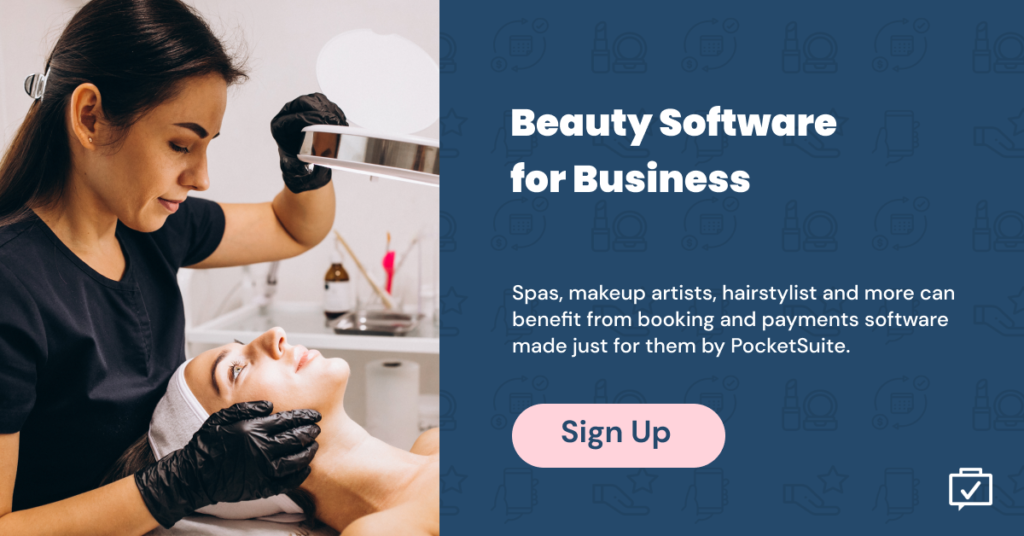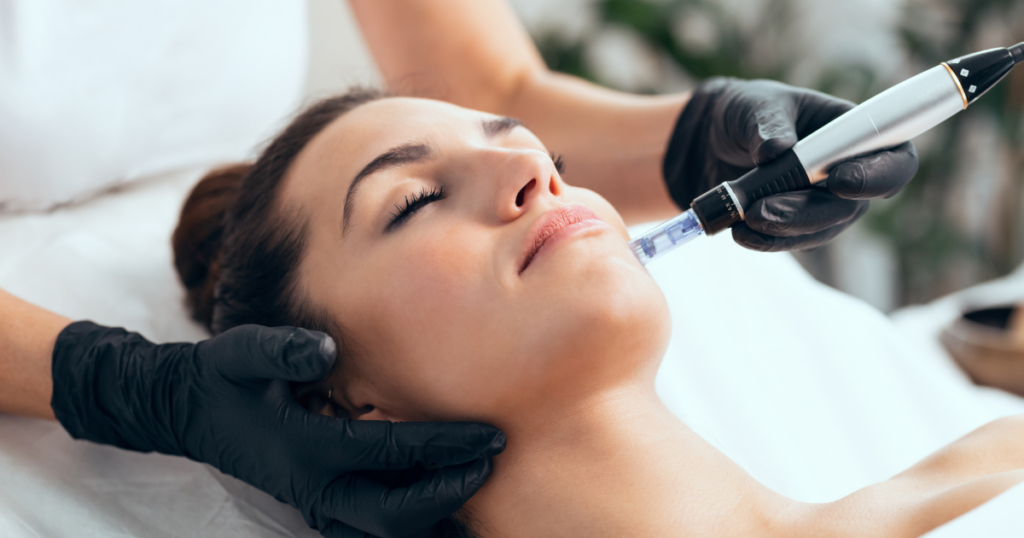Beauty specialists are in high demand. And lots of solo entrepreneurs are looking to get in on the rewards of this ever-growing industry. They often choose between two of the most popular and high-earning beauty professionals: Esthetician vs Cosmetologist. But how are they different, and how can you tell which career is right for you?
In this article, we compare estheticians to cosmetologists to help aspiring beauty business owners choose the best path.

What is a cosmetologist?
A cosmetologist is trained to perform a wide range of beauty services. They typically have the skills of a hairstylist, nail tech, and makeup artist in one. Some people use the term cosmetologist to refer to someone who specializes in any one of these beauty areas. However, a cosmetologist is trained and licensed to perform services across some or all of these beauty disciplines.
What is an esthetician?
While cosmetologists are trained in a number of beauty disciplines, estheticians are experts in skincare. An esthetician is a licensed skincare specialist. They are trained and licensed to perform a variety of skin treatments on clients, like waxing, facials, and chemical peels.
What are the biggest differences between estheticians and cosmetologists?
Before we tackle the the big question, i.e., Esthetician vs cosmetologist: which business you start?, we need to understand their differences. As a beauty pro, you might handle everything from hair to skin to nails or choose to specialize. While there are people who use the terms interchangeably, it’s important to know the difference between an esthetician and a cosmetologist.
Here are the main differences between estheticians and cosmetologists.
#1 Education and Training
Whether you become an esthetician or a cosmetologist, you must attend a beauty school. Beauty school is key to growing your beauty career. Usually, beauty professionals go to cosmetology courses at an independent beauty school or attend a community college. You can enroll in a certificate program at a beauty school or work to get your Associate’s degree in Cosmetology.
While cosmetologists and estheticians both attend beauty school, their coursework will look very different. For example, cosmetologists may learn some specialized skin care treatments during beauty school. But it’s unlikely that an esthetician will train in other beauty disciplines as part of their core program. Also, estheticians are trained to use specialized equipment for treatments like microdermabrasion and LED therapy. Either way, students get a mix of hands-on training and theoretical classes.

Cosmetology school prepares you to grow as a beauty professional and run your own business. So expect to learn about client management and retention, as well as participate in a student-run clinic. Beauty school can take anywhere from a few months to two years to complete. So, be prepared to make a time commitment. The good news is that there are usually options in your area to attend cosmetology or esthetician school online. These are typically hybrid programs for flexibility.
#2 Licensing
Both estheticians and cosmetologists must obtain a license to perform beauty services. Licensing requirements vary from state to state. So, check your local laws.
Estheticians typically need to complete 600 hours of training and pass an exam to obtain their license. In general, cosmetologists must receive more training hours, around 1,500, to receive their license. In some states, you may have to obtain a cosmetology license to perform esthetic services.
Beauty professionals may be required to receive continuing education credits to renew their license.
#3 Services
As an esthetician, you’ll analyze your client’s skin type, identify problem areas, and recommend treatments of products to help them crush their skincare goals.
As a cosmetologist, you’ll be able to offer a variety of services to clients. They can get their hair, makeup, and nails done all from one provider. It’s particularly convenient for events like weddings where the clients need all of these services anyway.

Cosmetologists don’t have to specialize. They can keep their services general to attract a wider client base. However, this can have its drawbacks. For example, some clients prefer to see an expert. So, it’s good to have a specialty you’re known for, like weave installation or microblading.
#4 Income
According to the U.S. Bureau of Labor Statistics, cosmetologists earn about $39,000 per year on average, while estheticians earn about $48,000 per year on average. That’s a big gap, but it can vary depending on where you live and what kind of beauty services you provide.
Whether you choose to become an esthetician or cosmetologist, you can earn more money by starting your own business. As a business owner, you’ll build a loyal client list, make your own schedule, and set your own rates. Independent estheticians and cosmetologists can earn six figures per year by focusing on their own businesses.
#5 Career Outcomes
Estheticians and cosmetologists have vastly different career outcomes. Estheticians usually work in spas or salons and may become:
- Spa technicians or managers performing general esthetics services like facials, chemical peels, etc
- Hair removal specialists skilled at waxing, threading, sugaring, or laser treatments
- Permanent makeup technicians with expertise in lip tinting, microblading, etc.
Estheticians can go on to specialize as medical estheticians or master estheticians if they want to perform advanced treatments and earn more money. They might even work in a medical facility.
On the other hand, cosmetologists may have more variety when it comes to where they can work. Cosmetologists might be anything from barbers to braiding specialists to nail and brow technicians. Or, they can offer a combination of all these beauty services. It’s a good option if you want to be a part of the beauty industry but don’t want to limit yourself to one discipline.

Have you made your choice?
Many aspiring beauty professionals eventually have to make a choice: esthetician vs cosmetologist. Both are profitable careers. Just make sure the education, skills, and outcomes align with your personal career goals.
Whatever you choose, PocketSuite can help grow your beauty business. We’re an all-in-one app to manage clients and earn more money doing what you love.



